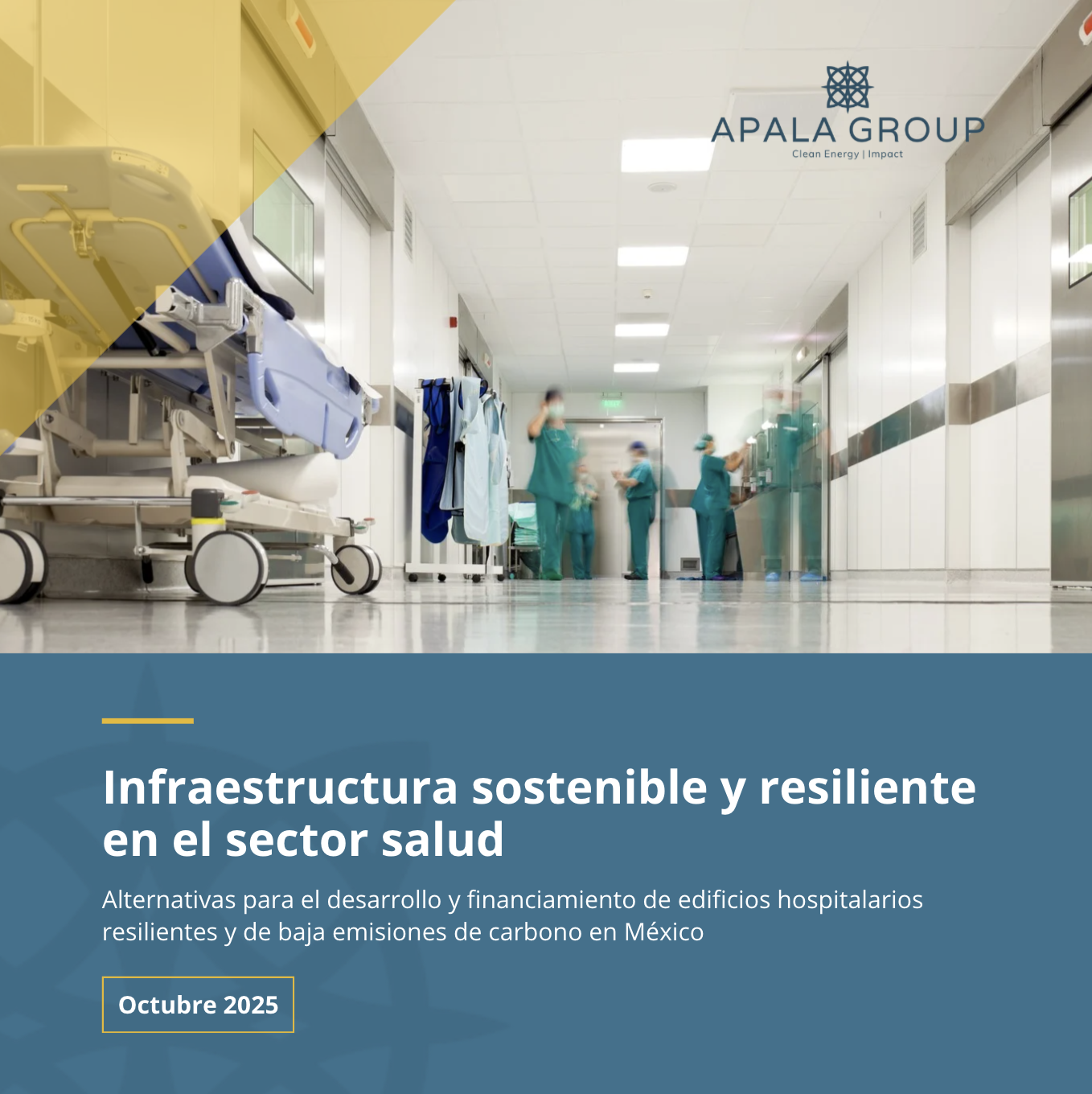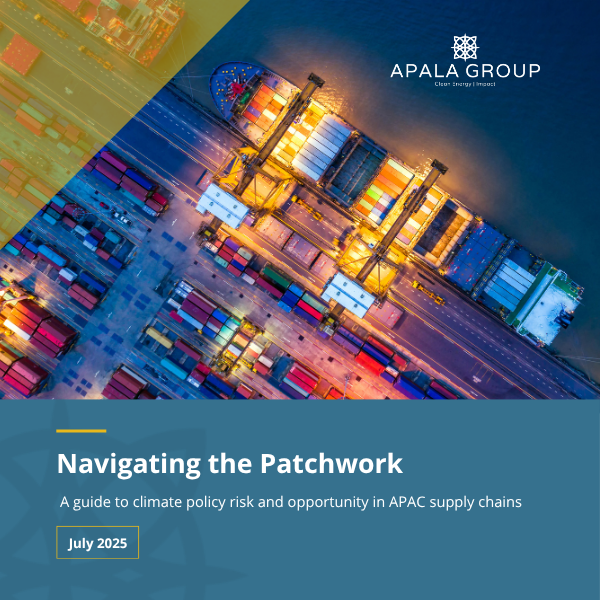
Blogs
2025 Climate Action in Review: Reflections from Apala Group’s Work Across APAC, Latin America, and the Caribbean
A look back at Apala Group’s 2025, exploring climate action, regional developments, and some of the partnerships that shaped our work across APAC, Latin America, and the Caribbean.
Science-Based Targets: Turning Climate Ambition into Corporate Strategy
Discover how the Science Based Targets initiative (SBTi) is guiding thousands of companies worldwide to align climate action with science, set measurable emissions targets, and navigate the challenges of decarbonization — and how Apala Group, in turn, supports corporates in SBTi alignment.
Vietnam’s Renewable Energy Market Heats Up: What’s Next for DPPA in 2025?
Vietnam’s renewable energy landscape is evolving fast. With the release of Decree 57/2025/ND-CP, the long-anticipated Direct Power Purchase Agreement (DPPA) framework is finally taking shape, bringing new opportunities and challenges for corporate renewable energy buyers. This article breaks down what’s changed, what’s still in progress, and what global buyers need to watch as Vietnam moves toward implementation in 2025.
What’s Next: Thailand
Thailand’s renewable energy market is at a pivotal moment. With new programs like UGT1 and the upcoming UGT2, plus the long-anticipated Third Party Access (TPA) and Direct PPA mechanisms, 2025 is shaping up to be a landmark year for clean energy procurement. This article breaks down key policy shifts and what they mean for corporate energy buyers across the region.
What’s Next: Taiwan
Taiwan's renewable energy market is evolving, with liberalization efforts and new programs like RE30 shaping corporate procurement strategies. Despite challenges such as high renewable energy premiums and Taipower's financial constraints, initiatives are underway to balance supply, pricing, and policy. This article explores the complexities and future prospects of Taiwan's energy transition.
Buildings and Their Close Link with Energy and Climate Change
Today, it is imperative to recognize that cities are a catalyst for development and growth. At the same time, they play a crucial role in the fight against climate change. As such, implementing measures to reduce the environmental impact of the building sector can help ensure that cities of the future are inclusive, safe, resilient and sustainable spaces; but the reality is a little more complex.
Vietnam Energy Sector: January 2025 Recap
Vietnam’s Power Development Plan (PDP) has outlined the country’s energy sector goals since 1981, beginning with PDP1. The latest version, PDP8, approved in May 2023, establishes the energy resource structure for 2021–2030, with a vision extending to 2050. As the country heads into the official calendar year and the “era of national rise” under To Lam, there is heightened anticipation regarding the sector’s direction.
2024 Renewable Energy and Carbon in Review
As the realities of the climate crisis become ever more visible, many across the globe are navigating unique challenges and opportunities in their pursuit of a sustainable future. In 2024, countries in the Asia Pacific (APAC), Latin America and the Caribbean emerged as key players in this phenomenon, leveraging their rich natural resources and special technologies amid acute climate vulnerabilities, to pioneer innovative approaches to sustainable development. This article serves as a recap of the notable trends and developments in renewable energy and carbon markets within these emerging regions over the past year, offering insights into both the promise and complexities of their rapidly evolving landscapes.
A Deep Dive into PPAs and VPPAs in East Asia
In today's ever-evolving global business landscape, companies are proactively exploring sustainable solutions to reduce their carbon footprint and actively participate in environmental conservation. An integral aspect of these endeavors is the deliberate pursuit of higher-impact opportunities for renewable energy sourcing within the dynamic Asian markets, including Power Purchase Agreements (PPAs) and Virtual Power Purchase Agreements (VPPAs).
Taiwan Round 3-2 Offshore Wind Auction
The Taiwan Ministry of Environment unveiled draft rules for the Round 3-2 offshore wind auction at the end of September, shedding light on adjustments to national offshore wind development restrictions. The auction will involve a two-phase selection process, beginning with a rigorous “performance review” assessing technical, financial, and industrial linkage commitments. Only developers meeting these high standards will progress to the “competitive evaluation” phase, where pricing and industrial linkage strategies will be decisive.
Opportunities and Challenges for Renewables Procurement in Asia
With the majority of a company's greenhouse gas (GHG) emissions stemming from supply chain activities and the Asian market serving as the primary hub for supply chains, US-based corporations are increasingly turning their gaze toward Asia to find opportunities for decarbonization. While strategies like optimizing supply chain efficiency and electrification are available to mitigate emissions, the most substantial and promising avenue currently lies in procuring renewable energy.
Colombia’s Climate Strategy for 2050
Although Colombia is only a contributor of 1% of Global Greenhouse Gas Emissions, the country is highly committed to decarbonizing its industries not only to reduce their environmental impact but also to foster economic growth in the region.
Designing and Delivering Scope 3 Emissions Reductions
Corporations globally are increasingly looking to address the carbon emissions associated with their business. While most companies have thus far focused on reducing emissions within the boundaries of Scopes 1 and 2, the greatest opportunity for reductions lies in the realm of Scope 3 emissions, which average 5.5 times more emissions than both Scopes 1 and 2 combined. This article aims to pinpoint some of the best practices recommended by Science Based Target initiative (SBTi) for companies to reduce their carbon footprint.
Roadmapping Supply Chain Decarbonization
In conversations with Apala Group’s clients, we have identified that initiating a decarbonization roadmap is a critical first step. To assist in this process and drive decarbonization in alignment with a 1.5°C scenario, we have created a supply chain decarbonization roadmap below. While the following parameters have been described in general terms, each will require more informed, nuanced steps specific to the each company’s unique supply chain, goals and available pathways.
The Global Impact of the EU’s Carbon Border Adjustment Mechanism (CBAM)
In July 2021, the EU announced a Carbon Border Adjustment Mechanism aimed at avoiding carbon leakage from the EU and promoting emissions reductions worldwide. Apala Group’s Nidhi Gangavarapu takes a closer look at the mechanics of the policy and whether it has the potential for significant global impact.
Can Mexico Unlock Its Renewable Energy Potential?
Mexico’s potential for renewable energy development is considerable and opportunities exist to promote a variety of different technologies. However, Mexico is currently undergoing a political shift with plans to reform the energy sector once again, reverting back to a nationalized electricity market. This shift, if realized, will make it more difficult for corporations to find renewable energy options to meet their decarbonization targets.
Latin America Climate Commitments at COP 26
Latin America’s attendance at last year's COP-26 conference in Glasgow highlighted the vulnerability that these emerging economies face. Apala Group has created a summary of key Latin American countries' pledges following the 2021 COP-26 international gathering.
A Renewable Future for South Korea?
South Korea currently stands as the fifth largest coal power generator globally and fourth largest importer of LNG. With a non-hydro renewable energy mix of only 4% as of 2020, it begs the question as to whether these commitments are achievable and how might South Korea develop its renewable sector with land constraints similar to that of Japan and Taiwan?
Asia Pacific Climate Commitments at COP26
The APAC region is responsible for 52% of global carbon dioxide emissions and several key emitters from this region adopted pledges and commitments in support of the 1.5 degree global warming goal. For companies with supply operations and chains in the Asia Pacific region, these commitments help demonstrate the trajectory of country-level decarbonization efforts. In our latest Insights piece, we have summarized a few noteworthy commitments from the APAC region.
Procure with Purpose: The Deal Structure Matters
Previously Emily Haworth explored ways corporate buyers of renewable energy can increase the positive impact of the projects they support. We now take a look at the importance of the structure of a purchase of renewable energy and how different transaction structures can be evaluated from an impact perspective. Specifically, we find that there are three different types of impacts that can be created when a purchaser commits to buying renewable energy: 1) Direct financial impact on a specific project, 2) Contribution to aggregate market impact 3) Creating new opportunities for renewable energy purchases by driving market innovation.
Market Reports






























